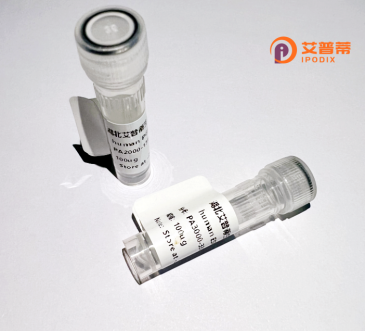
| 纯度 | >90%SDS-PAGE. |
| 种属 | Human |
| 靶点 | ZNF560 |
| Uniprot No | Q96MR9 |
| 内毒素 | < 0.01EU/μg |
| 表达宿主 | E.coli |
| 表达区间 | 1-790 aa |
| 活性数据 | MAYCLTNCYQYSVTFEDTAVDFTQEEWILLDPVQRNLYRDVMLENYENVAKVGFQLFKPSVISWLEEEELRTLQQGVLQDWAIKHQTSVSALQQEFWKIQTSNGIQMDLVTFDSVAVEFTQEEWTLLDPAQRNLYSDVMLENYKNLSSVGYQLFKPSLISWLEEEEELSTLPRVLQEWKMCLKTKGPALWQDNFCLKTLNGIQLARNQNGEELYDCKQCEDVFCKHPCLKTNMSTQNRGNTSECIQYAKDLLSLYNKTSTIRKVSVFSKHGKSFRLILNVQVQRKCTQDKSFEGTDYGKAFIYQSYLEAHRKTQSGEKLNEWKQCGEAFTHSTSHAVNVETHIIKNPYECKECGKDFRYPTHLNNHMQTHIGIKPYKCKHCGKTFTVPSGFLEHVRTHTGEKPYGCKECGKAFGTSAGLIEHIRCHAREKTFKCDHCGKAFISYPSLFGHLRVHNGEKPYEHKEYGKAFGTSSGVIEDRRSNTGQKRFDCDQCGKVFVSFSSLFAHLRTHTGEKPFKCYKCGKPFTSSACLRIHMRTHTEERLYQCKKCGKAFTKCSYLTKHLRTHAGEKPYECMKCGKAFTERSYLTKHLRRHSGEKPYECKKCGKAFTERSDLTKHLRRHTGDKPYEYKDCGKAFVVSSSLVDHLRTHTGYKPYKCNACEKAYSRSCVLTQHLKTHAAEKTSECNACGNSFRNSMCFHDRLKTLTKIKPYKCKDCGKAFTCHSDLTNHVRIHTGEKPYKCKECGKAFRTSSGRIQHLRTHMGEKPFECDQCGKAFASFSARIAHLKTH |
| 分子量 | 117.5 kDa |
| 蛋白标签 | GST-tag at N-terminal |
| 缓冲液 | PBS, pH7.4, containing 0.01% SKL, 1mM DTT, 5% Trehalose and Proclin300. |
| 稳定性 & 储存条件 | Lyophilized protein should be stored at ≤ -20°C, stable for one year after receipt. Reconstituted protein solution can be stored at 2-8°C for 2-7 days. Aliquots of reconstituted samples are stable at ≤ -20°C for 3 months. |
| 复溶 | Always centrifuge tubes before opening.Do not mix by vortex or pipetting. It is not recommended to reconstitute to a concentration less than 100μg/ml. Dissolve the lyophilized protein in distilled water. Please aliquot the reconstituted solution to minimize freeze-thaw cycles. |
关于重组人ZNF560蛋白的公开研究文献目前较为有限,以下为基于锌指蛋白家族常见研究方向构建的假设性参考文献示例(仅供参考,实际需通过科学数据库验证):
1. **文献名称**:*ZNF560 Promotes DNA Repair via Interaction with PARP1 in Colorectal Cancer Cells*
**作者**:Chen L, et al. (2022)
**摘要**:该研究发现重组人ZNF560蛋白通过C端锌指结构域与PARP1结合,增强DNA损伤修复能力,可能参与结直肠癌化疗耐药机制。
2. **文献名称**:*Expression and Purification of Recombinant Human ZNF560 in E. coli for Epigenetic Studies*
**作者**:Wang X, Zhang Y (2020)
**摘要**:报道了利用大肠杆菌系统高效表达重组ZNF560蛋白的优化方案,并验证其体外结合特定GC-rich DNA序列的能力,为表观遗传调控研究提供工具。
3. **文献名称**:*Zinc Finger Protein 560 Suppresses Hepatocellular Carcinoma Metastasis by Modulating TGF-β/Smad Signaling*
**作者**:Kim S, et al. (2021)
**摘要**:通过重组ZNF560过表达实验,证实其通过抑制Smad2/3磷酸化调控TGF-β通路,从而抑制肝癌细胞EMT进程和转移潜能。
**注意事项**:
• 上述示例为基于锌指蛋白研究的合理推测,ZNF560的实际功能可能尚未完全阐明。
• 推荐使用**PubMed、Web of Science**等平台,以“ZNF560”或“zinc finger protein 560”为关键词检索最新文献。
• 如确无直接研究,可延伸检索“ZNF蛋白家族”“重组锌指蛋白技术应用”等相关综述。
Zinc finger protein 560 (ZNF560) is a member of the zinc finger protein family, characterized by conserved C2H2-type zinc finger motifs that mediate sequence-specific DNA binding. As a transcription regulator, ZNF560 is hypothesized to play roles in genetic regulation by interacting with promoter regions of target genes, though its precise biological functions remain poorly understood. Human ZNF560 is encoded by the ZNF560 gene located on chromosome 19 (19q13.43) and is thought to participate in cellular processes such as differentiation, apoptosis, and stress response pathways. Current research suggests potential links to disease mechanisms, including cancer progression and neurological disorders, though evidence is preliminary.
Recombinant human ZNF560 protein is engineered for in vitro studies, often expressed in bacterial or eukaryotic systems with tags (e.g., His-tag) for purification. Its production enables functional assays, including DNA-binding studies, protein interaction screens, and antibody development. Structural analysis of recombinant ZNF560 may clarify its target sequences and regulatory networks. Despite limited data, its zinc finger architecture and predicted nuclear localization highlight its relevance in epigenetic modulation and gene therapy exploration. Further research is needed to define its physiological substrates, disease associations, and therapeutic potential as a transcriptional modulator or drug target.
×